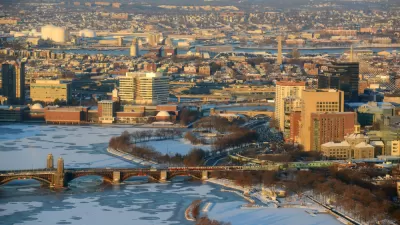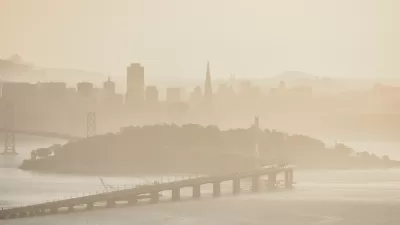The Intergovernmental Panel on Climate Change (IPCC) issued a follow-up report to another in September that focused on the cause of climate change. The report released Monday focuses on the disruption that climate change will cause human society.
"For the first time, the IPCC has scientifically linked the changing climate with the destabilization of nation states," blogs Eric Holthaus on the new report, the culmination of the research of hundreds of expert scientists. Hothaus, a former Wall Street Journal meteorologist who specializes in linking extreme weather and other calamities to climate change for Slate’s Future Tense, points to disruptions in "food crops, water supplies, and human health."
This is a follow-up to a similarly major report issued last September, which concluded the scientific evidence for climate change was “unequivocal,” with human activity “extremely likely” to be the dominant cause. If September’s report answered the question of “what’s happening to the climate and why?”, this one tackled the more practical “So, what does it mean for us?”
The IPCC report, titled "Climate Change 2014: Impacts, Adaptation, and Vulnerability" was prepared by 309 world scientists from 70 countries and released in Yokahoma, Japan on Monday, March 21. It is IPCC's Fifth Assessment Report and is intended to "provide a clear view of the current state of scientific knowledge relevant to climate change."
According to their press release (PDF), "The report identifies vulnerable people, industries, and ecosystems around the world. It finds that risk from a changing climate comes from vulnerability (lack of preparedness) and exposure (people or assets in harm’s way) overlapping with hazards (triggering climate events or trends). Each of these three components can be a target for smart actions to decrease risk."
If this sounds rather dry, consider The Guardian's coverage: "If rising sea levels, reduced crops and dying reefs aren't enough to get you worried about the content in the IPCC's report, perhaps the fate of your morning coffee will do it."
My Guardian colleague Damian Carrington writes:
Global warming is leading to bad, expensive coffee. Almost 2bn cups of coffee perk up its drinkers every day, but a perfect storm of rising heat, extreme weather and ferocious pests mean the highland bean is running out of cool mountainsides on which it flourishes.
FULL STORY: New U.N. Report: Climate Change Risks Destabilizing Human Society

Alabama: Trump Terminates Settlements for Black Communities Harmed By Raw Sewage
Trump deemed the landmark civil rights agreement “illegal DEI and environmental justice policy.”

Planetizen Federal Action Tracker
A weekly monitor of how Trump’s orders and actions are impacting planners and planning in America.

The 120 Year Old Tiny Home Villages That Sheltered San Francisco’s Earthquake Refugees
More than a century ago, San Francisco mobilized to house thousands of residents displaced by the 1906 earthquake. Could their strategy offer a model for the present?

San Francisco Opens Park on Former Great Highway
The Sunset Dunes park’s grand opening attracted both fans and detractors.

Oregon Legislature to Consider Transit Funding Laws
One proposal would increase the state’s payroll tax by .08% to fund transit agencies and expand service.

Housing Vouchers as a Key Piece of Houston’s Housing Strategy
The Houston Housing Authority supports 19,000 households through the housing voucher program.
Urban Design for Planners 1: Software Tools
This six-course series explores essential urban design concepts using open source software and equips planners with the tools they need to participate fully in the urban design process.
Planning for Universal Design
Learn the tools for implementing Universal Design in planning regulations.
Clanton & Associates, Inc.
Jessamine County Fiscal Court
Institute for Housing and Urban Development Studies (IHS)
City of Grandview
Harvard GSD Executive Education
Toledo-Lucas County Plan Commissions
Salt Lake City
NYU Wagner Graduate School of Public Service





























